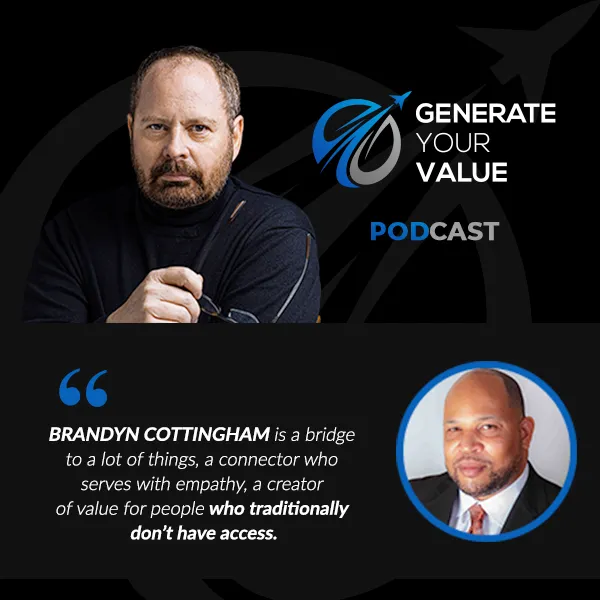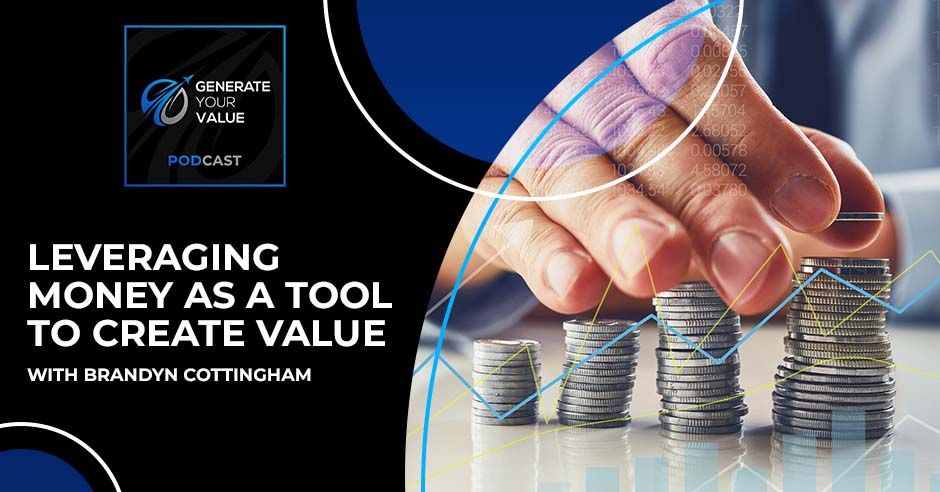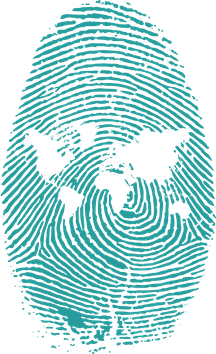We all have the ability to create value. How to see it through and get that value far and wide is often a challenge that, realistically, money can provide. Brandyn Cottingham believes in this. For him, money is the fuel that takes you anywhere. He has the story to tell us about that in this episode. Brandyn is an economic impact investor and community activist, focused on producing positive winning scenarios for the stakeholders of underserved and diverse communities. He shares with us his life’s story that took him from the Marine Corps to audio engineering to finance. The last one, he uses as a vehicle to further create value and impact. Tune in to this conversation and discover how Brandyn leverages money as a tool. Find out how you, too, can do that.
LISTEN TO THE PODCAST HERE
Leveraging Money As A Tool To Create Value With Brandyn Cottingham
I can’t thank you enough for joining us on this episode. As always, we would like to bring you great guests and interesting people. Through our conversation, you’re hopefully going to leave what we call golden nuggets that you can take and integrate into your life in the search or to hope that you’re living a life strategy that’s going to bring about joy, happiness, and success in your life. If you’re not doing that, please read a lot of our episodes to help you to get onto that journey. Unfortunately, my partner in crime, Zach Levy, couldn’t join us for this episode. That’s okay. We keep marching on to the same drummer in an effort to bring you a great episode.
My guest is Mr. Brandyn Cottingham. He’s in the financial world. We’re going to be talking a lot about pennies, dollars, and so forth. Brandyn’s bio reads as follows. As an economic impact investor and community activist, Brandyn Cottingham is focused on producing positive winning scenarios for the stakeholders of underserved and diverse communities. 1 in 50 Black Americans is a millionaire. Says Brandyn, “One of my missions is to make that number 1 in 25.”
Beneath the top-down methodology driven by quantitative and qualitative analysis stands Lumiere, an intimate referral-based firm where Brandyn is a partner. It’s about aggregating wealth, “Together with our partners, we are designing stabilized financial structures for entry into the market, doing our part to architect our future.” Brandyn is a dedicated family man, President of the Fort Bend County MUD 24 Board, a member of Phi Beta Sigma Fraternity, and a veteran of the United States Marine Corps. Brandyn, welcome to the show. I can’t thank you enough for coming on to our show.
Thank you, Andy. It’s great to be here. I appreciate the time to participate with you.
We always like to start with the life story. On this show, storytelling is a powerful tool in leadership, life, and so forth. If you wouldn’t mind, give our audience an idea of your upbringing, your life, and how it is that you got to where you are.

I’m the oldest child of Cass and Loice Cottingham. They’re still married for years. They have known each other since they were eighteen. It’s a serious blessing to have both my parents as long as I’ve had them still in my life. I was born in North Louisiana where both my parents are from. We moved to Houston, Texas when I was about 4 or 5. When I grew up right outside of Houston, it was small. Now, it’s a full long suburb. Back then, it was a small country town.
I was in one of the predominantly White areas. There were very few Black families there. We’re the only Black family at our church. That tells you the environment that we grew up in the ’80s and ’90s. It’s a little bit different than now. I grew up there. I had a great childhood. I can’t say enough how great my parents were and the sacrifices they made. It’s one of those things. Until you’re a parent, you don’t understand all the work your parents do for you or did.
I got a couple of siblings. I joined the Marine Corps out of high school. I was a musician in high school. Our band was a competitive band. We were very fortunate. Our band director was Mr. Jack Ferris. I told people we ran that thing like a football program. You maturated from sixth grade all the way through to fifth grade to high school if you wanted to. That’s the path I took.
I remember getting lined up. You do those drills of football. They put you up head-to-head. They put me up against some big dude. I was supposedly running back. All I remember is looking up and being like, “I’m good.” My birthday is in September. I was a year younger than most of those guys. When you’re 11 or 12, those 6 months or 1 year make a big difference.
I was born in September too. I’m right there with you.
I didn’t hit my size until I was 14 to 15. I started gaining some weight. I was like, “I could do this,” but by then, I was heavily into music. My dad was a musician on my dad’s side. They come from a family of musicians. My uncle was a music teacher. He taught jazz music and has a degree in Music. Until I came along, my dad did Computer Science. I was recruited out of high school, joined the Marine Corps, and separated from the Marine Corps a little early.
I didn’t have the experience I was hoping to have but I still had a great experience now that I look back on it. I was a little devastated because it was early for me. I got an administrative separation. It took me about eighteen years to be able to say that publicly from the level of shame that I felt from that. I’m saying that because it’s part of my story.
After I got into the Marine Corps, I bumped around for almost a decade, trying to find value for myself and where I was supposed to go. I decided to finally go back to school and got a degree in Audio Engineering here in Houston at the Houston Community College. From there, I went to Texas Southern University. I was planning on finishing up a four-year degree in Audio Engineering. There were some logistical issues. The program wasn’t fully functioning by the time I got there. I ended up studying Finance.
My goal there was to focus on Audio Engineering and study Business Management because I was going to open my studio. That didn’t plan out the way it was supposed to because the program wasn’t up and running but I ended up still studying Finance. I majored in Finance, which ended up being a serious blessing. A buddy of mine came to me and was like, “Why are you doing management?”
I was like, “What do you mean?” He was like, “You’re a pretty smart guy. You should probably do accounting or finance.” I was like, “What’s the difference? I’m trying to run a business. I need to know how to manage.” He was like, “Managing people is a lot of soft skills. You’ve already got that. You’ve got the gravitas. You can deal with people. You need to understand these functions and what’s physically happening in the business. Accounting and finance are like a skillset.”
You leave there almost like an engineer or a mathematician when it comes to business structures and things like that. That was probably one of the best pieces of advice I ever got in school for the direction I was going. I switched to Finance. It was awesome but here’s the other thing that happened when I was at Texas Southern, which is a historically Black college university. I don’t know if you’re familiar with HBCUs here in Houston.
I got a comment in my head about it. We could go back to earlier in your life. Go ahead.
While I was there at Texas Southern, I took the opportunity to be as immersed in the culture as I could. I was a non-traditional student. I was 32 when I got there, being a veteran and kicking around for a while. I wanted this specific type of curated experience. I could have gone to Texas State. I chose Texas Southern because it’s an HBCU. A buddy of mine and I started a program that was centered around an urban farm. I don’t know how we were able to make all this but we got two acres of green space inside of an urban area, which is normally unheard of for student recreational use.
2011 is when we started that. It has been over a decade. That asset is still standing. We created an urban farm. From the programmatic standpoint, we were interfacing with all the stakeholders of the Third Ward area, which is where TSU is. It’s an economic desert, a food desert, and a political desert. You name it. It’s a desert. Our focus was to impact positively people in the community. We used sustainability in food as a way of connecting everybody.
When we ran student programs. I knew if I could get to a kid, I could get to a parent. It was highly successful. I ended up being on TSU’s sustainability board. We did beatification specifically around the university. From that work, I became a National Wildlife Federation fellow class of 2014 but when I stepped back and looked at everything, I was like, “I was able to do this.”
At the time, I was still studying Finance. Keep that in mind. I was able to step back at the end, take a look at everything, and be like, “I was able to do this much impact and create this much value for people with will and want.” I understood the money and how to track it but I didn’t understand how to create a deal. I knew that if I could do this with sheer effort, will, and want, what could I do if I coupled that with understanding how to get access to cash and real capital? How much impact could I make on people?
That’s what started me on the journey of meeting one of my mentors who taught me about funds and syndications. From there, it snowballed into a buddy of mine and I creating our fund. We had our fund up. The other managing partner with me in our firm joined in. At that time, he had about eighteen years of experience in designing financial structures specifically for city areas of private equity firms in large Fortune 100 and 300 companies all through the Southeast and Eastern seaboard of the US. He did that and came on with us. It has been a great experience. We were rocking ever since.
I’ve learned now how to be a deal creator. I handled more of the business development side. He’s more on the operational side. We stick with our strengths more. It has been a great experience. We have been able to meet tons of amazing people and stuff I never would have thought I would have access to. It has been awesome. It allows me now to meet people at different places in their lives and to create value for them. I was homeless at one time. I was technically a homeless veteran. I didn’t have my name on a lease or a mortgage. At the time, I was technically homeless.
I was in the first group of veterans that got what’s called a HUD-VASH. After the housing crisis in 2008, I was still in school full-time. I ended up losing my apartment, trying to stay in school, and everything else. From there, I was able to stabilize, get on the program, and finish school. My wife and I are homeowners. We got two beautiful children. We’re building this business from all that stuff. I was able to go off because I’ve had these experiences. At all levels, now I can meet people and create leverage for them inside of an investment. The best example I can give is real estate.
A lot of people come to me and say, “I want to do real estate.” The first question I asked them is, “Do you want to do real estate? Do you want to benefit from the advantages of real estate?” They go, “I want to benefit.” You’re an operator. You’re an engineer. You’re an attorney. Doing real estate is not a hobby. It can be for some people but for most people, it’s a full-on business.
Doing real estate is not a hobby. For most people it’s, it’s a full-on business.
I tried to do it as a hobby. It didn’t work. It’s a business. Understanding that now allows me to create that leverage for people because we’re deal creators. We can control both ends of the stick. I can meet people, find out where their entry point is, what they qualify for, what their value proposition is, and what their vision is, and align an opportunity for them specifically. Everybody from an institutional investor to a retail investor is looking to get in the game and create the best leverage point.
I can explain to people how that all works, what the ups, downs, and risks are at each entry point that you’re going to face, and how you hedge against those. You can’t hedge against some of them but at least when you walk into it, you understand, “This is what the risk is and where I’m at.” For a lot of people, that’s one of the biggest things. They don’t know all the dark corners, what stones, what flashlights, and whatnots to look under. They get bit in the ass by that.
All that stems around from me coming from a place of, “How do I provide access for people who traditionally don’t have access?” We’re merging these worlds and being a bridge. I told a lot of people, “I’m a bridge to a lot of things, and I didn’t realize that growing up.” I used to look at why am I the only Black kid growing up in this community. I’m seeing as I’ve gotten older the benefits of all that stuff. The universe has its ways of working. It’s working itself out now years later but it’s cool.
We’ve got some common elements in my upbringing. I grew up in a town where we had one Black family and a couple of Black kids in our high school. The one that was in my class was our tremendous hockey goalie. He took us to state championships and so forth. I didn’t live your life but I was one of those guys that was surrounding you from that perspective. I want to go back to the beginning. What instrument did you play?
My dad taught us to play piano when we were kids. He taught us to read music and all that stuff. I knew how to read music but the first instrument I learned to play was the trumpet. I did that for about 1 year or maybe 2, and then I switched to euphonium. At that time, it was a baritone, which is a mix between a trombone and a tuba. At one time, it was called a tenor tuba. A lot of people don’t know this fun fact. It’s the closest instrument to the human voice.
I had no idea. It’s the human voice from a tone perspective.
From a timbre texture. It’s called a baritone. I found out that was one of the main reasons why I was accepted into the Marine Corps. I wasn’t the most technical guy. I was young. I was 15 or 16 when I passed. When I got into the Marine Corps, these people have degrees in Music. There are some amazing musicians. I was like, “Why am I here?” I was good. I’m not saying I wasn’t good but I found out it was my ability to create a specific type of sound.
The recruiters and everybody were like, “You have that euphonium sound. It soars above the band like it’s supposed to.” Some of that was the way I played. It was almost like I would sing through the instrument. You can create a certain resonance if you can make your embouchure and throat do some different things. Naturally, for me, it worked out.
Part of the reason I wanted to go back to that as somebody who lives in the Northern suburb of Atlanta is I’ve seen some of the competitions that occur here in Atlanta, bringing in the historically Black colleges for band competitions. It’s inspiring to watch not only the quality of the sound and the arrangements that are put together but to watch the teamwork in the competition. I don’t mean bands go out, play a couple of numbers, leave, and hope they win. This is outright warfare.
It’s the good old battle of the bands.
There’s a lot of pride. There’s a lot of hard work that’s put into this. If you ever have the time to go on YouTube, catch it live, or whatever you can, and it turns into a competition, you will walk away with a smile on your face guaranteed to watch these people work.
My father was a G man. My parents went to Grambling, which is another university up in Northwest Louisiana. My dad did a year in the band. He was like, “We trained just as hard or harder than football players did.” Not only did we have to physically train. For those of you who haven’t seen an HBCU, when I say physical training, you need to watch what they do, how they perform, and the level of athleticism those people are doing for 10 or 15 minutes of a show.
You will understand what we’re talking about. You also have to learn the music on top of that. Not only do you have to be physically and emotionally in shape but mentally as well to remember all the information that you have to remember. Those songs change from week to week. They’re learning those things every week. It’s very interesting. They’re writing a lot of them. They write the arrangements themselves too.
I’m glad you brought up that comment. They’re very much athletes. When you sit down and watch the performances, you will understand that comment as to why they are athletes for what they put themselves through in an effort for entertainment. It’s a great thing to see. After that, you went on a journey of discovery for yourself through the Marine Corps as you meandered around for ten years before getting yourself through college and to the point of doing what you’re doing. Did you have one important moment? Was it that whole journey of trial and tribulation that enabled you to get to that point of going, “I need to go to college. I need to go to Texas Southern and start doing something that’s going to bring value to my life as well as value to others?”
I’m a third-generation college student. Here’s a history fun fact. My grandfather was the first Black elected school board official to their parish since reconstruction ever in the history of the US. He went to college. I have great aunts and great uncles. They all went to Grambling too. I have one that went to Northwestern. My parents both went to college in Grambling. My aunts, uncles, and their siblings went to college.
For me growing up, joining the military was out of nowhere. They were always expecting, “The Cottingham boys are going to college.” That’s what we do. I showed up like, “I’m joining the Marine Corps.” My parents were like, “What?” That was a whole thing. Being a musician was very interesting. It’s almost like being treated as a D1 recruit. The recruiter came to my house multiple times. I had to convince my parents at seventeen that this was a thing for me to do.
There was always an expectation of greatness. I have an aunt. She passed years ago. She’s one of Arizona’s top 48 women of all time. One of her sisters was an amazing teacher. She was put up for Teacher of the Year multiple times in the state of Louisiana. My grandfather has done amazing things. They’re putting his memorabilia and things in museums up there.
I come from this expectation of Black excellence. It was always like, “We may not have a lot but we have class and respect, and you will conduct yourself as such.” I was a little antithetical to that for a while. Being separated from the Marine Corps brought a lot of shame to me. I internalized a lot of shame, which then left me in a place where I was not feeling confident to go back to my family. I felt like a failure, “No one would accept me. I would shame the family.” I deviated from the plan. It didn’t work.
As a man, you say, “Ladies aren’t dating me. I don’t have the nice gear. I’m living in a studio apartment. I’m surviving but I’m not surviving.” You reach a point in your life where you’re like, “I want more.” I didn’t know where to go. I wanted to go to school. I didn’t know what I wanted to go to school for. I didn’t know what I wanted to do. Everybody said, “Do what you love.”
That’s why I ended up getting a degree in Audio Engineering. I was close enough to music to where I was around musicians. I loved doing that stuff. It was great. I didn’t think it was going to bring me the level of economic stability I was looking for to be able to substantiate a wife, children, and the lifestyle I was looking for in the timeframe I wanted. I was like, “I need to do something else also.” That’s how it ended up being. Once I got into the industry, I was competing against 19-year-olds, and I was 30. I was like, “This isn’t going to work.”
At that time, entrepreneurship started coming up. I was introduced to some MLMs early in my life. I never succeeded in any of those but there was one group I was a part of. They got me reading. The first business book I ever read was The Master-Key to Riches by Napoleon Hill. That book framed up a lot of things for me. I was 25 or something like that. That was pre and post-all that stuff. I started reading Rich Dad Poor Dad, Good to Great, and Built to Last. I’ve read so many books like The Richest Man in Babylon and Who Moved My Cheese. You name them. I started reading them. I was going to school and reading.
I went through a phase where I stopped. I didn’t have internet or cable. I had a television and an Xbox. I would watch Charlie Rose and Tavis Smiley when I got home from work at night. That was it. I went through this phase of immersing myself and trying to reinvent myself in this new way. That’s how I started understanding business, structures, marketing, and all that stuff.
It was a process. It wasn’t one thing that happened here. The best thing was probably The Master-Key to Riches and the framing of the perspective about what it’s going to take to align myself with abundance and whatnot. I was also raised in the church. The idea of abundance wasn’t foreign to me. It was limited in my perspective but as I grow older, I started understanding and tapping more into that.
We could probably do a whole other episode on the church and abundance. I got a lot to say about that particular subject. You and I are kindred spirits from that standpoint. We have dealt with shame and judgment in our lives. We reached a point of saying, “This is not the life that I want for myself.” That was the trigger point for me in my life of saying, “I don’t like where I’m at.” In my case, I had a failed marriage. I brought that shame and judgment in as that baggage. That’s the baggage that I brought into the marriage. I sat there with divorce papers in my hands, going, “This is not it. This is not the life that I want for myself. I need to start working on building the life that I want for myself.”
You start getting curious and reading the books. I read a lot of books. I went to therapy, worked with a therapist, and started working on my mindset, my behaviors, and all those things necessary to pull me up by my bootstraps and start moving down a path that’s going to get me to a happy spot. Find what that is for yourself. It was something different for you than it was for me but you found your thing in finance. I found mine in aviation, at least the beginning, to get you through it, find your purpose and why in life, and start working, building, and creating the life that you want for yourself.
It’s interesting. People ask me if finance is my passion. I don’t necessarily know if finance is my passion, to be honest. Helping people and creating more value is truly my passion. A long time ago, it came to me. Somebody asked me, “What do you want to leave people with when you meet?” “I want them to leave with more value when I leave them than when I met them.” I use finance as my vehicle. That’s coupling to the point of how I was able to create value for people without money. I see that a lot.
That was one of the other revelations that I saw. There are a lot of great people doing a lot of great grassroots work on the ground. They’re great people. They have the best intentions. They’re good at what they do but no one knows who they are. They’re not growing. They’re impacting what they can in their arm’s length but outside of that, they’re not able to do that.
Most of that comes down to how they need more money. It’s not saying that money is the reason why you do something. I tell people, “You could build an F1 car, the fastest car in the world, the fastest jet, or whatever it is. If you don’t have fuel for the thing, it’s not going anywhere.” You can have the best intentions and the biggest heart but if you don’t have the resources to be able to touch all those people and move people to make that exchange in the right way, you’re not going to be able to spread your value as far.

That’s why I keep telling people, “Money is a tool.” Some people want to base their life entirely on that tool, “How big is my tool? How big is my hammer?” From that aspect, the reality is it’s a tool. How are you going to use that tool in the world? You can use it for good and bad. It’s still a tool. If they don’t have that tool behind them to help them go after what they want, then they’re only going to be able to go so far.
It’s not a bad thing. Society sometimes wants to say, “I need a bunch of money.” “Are you full of greed?” “No. It depends on what I want to do with it. Do I want to spend it on myself? That’s one thing. I want to use it as a tool to go do some things out in the world that are going to benefit people. That’s a whole different thing.”
Through this process, there are two things that I’ve come to understand and tell people. The first one is most of them need to go from an employee mindset to an executive mindset. It doesn’t mean you don’t have a job still or that you are an executive. It’s the way you approach business and how you look at business. The second thing I tell people is to switch from a consumer mindset to a producer mindset because that switches your relationship with money.
If I’m looking only at money from a consumption perspective, then I’m not looking at money to create leverage. I’m looking at money to find debt. I’m creating leverage but only for personal consumption. If I’m creating leverage to impact other people, that’s a different perspective. The result is different. They’re both around money. It’s a tool. I can use a hammer to build a house or break somebody’s arm. It all depends on their intention. It’s a tool but it’s all about the perspective from which you come from.
Switch from a consumer mindset to a producer mindset because that switches your relationship with money. If you’re looking only at money from a consumption perspective, then you’re not looking at money to create leverage.
In my 22-year career with Boeing, we had a term that we used from an HR perspective, RAA, which stood for Responsibility, Accountability, and Authority. In every position in the company, you can write a statement under those three categories. There are a lot of leaders in this world that focus on that authority piece because that’s where the power is, “I have this authority to do this and so forth,” as opposed to, “You should be concentrating on the responsibility part.”
When you look at a CEO of a company, the responsibility is, “I’m the head person in the company. I have these fiscal resources that are available to me. I am standing alone on top of this mountain. I have this big bucket of money. I’m the chief culture officer and the chief strategy officer. I’m going to make decisions now about the why of the company, the culture I want to have within the company, and my strategy.”
“Based on that strategy, I’m going to start pulling this money out of the bag and start hiring people or buying capital things, machinery, and whatever else I need to do for our why and what we’re producing as a product service.” The focus here is I’m making decisions with this tool. If you’re going to put a company in a pot of hot water in the oven and heat it, you’re boiling the company down to its smallest item. It’s about the head guy with a big bucket of money and where is he going to invest that money within his company to be successful.
From an operations perspective, that’s exactly it.
If you want to be successful in business, think about it that way. Even if you’re in middle management, it’s like, “I have this little area within the company I’m responsible for. In my responsibility, I’ve been given a bucket of money to go out and hire people that are going to work for me within my chunk of the company. How am I best going to use these financial resources to produce results that my upper echelon is asking for to contribute to what the CEO says?”
The key word there, and a lot of people miss this, is the plan. What’s that strategy? Just because you have a big bucket of money doesn’t mean you’re going to be successful in itself. All the time, we see people with large sums of money mess it up. That’s the underestimation of a good well-thought-out plan. Some people say it’s 80%, 10%, and 10%. I say it’s 80%, 15%, and 5%. Eighty percent of it is pre-planning. Fifteen percent of it is execution. Five percent of it is the analysis of what happened. We can figure out how to do it better the next time. You pre-plan. A lot of people want to skip that step. I’ve had so many people say, “You always want to focus on the negative.” I was like, “I’m not focused on the negative.” That’s that difference in the executive versus the employee mindset.
Just because you have a big bucket of money doesn’t mean you’re going to be successful in itself.
It’s a risk-managing executive. It’s not negative. You’re managing risks.
If you look at risk as a bad thing, you’re already behind the eight ball. It is. It’s exposure the same way as the elements in themselves. It’s raining here. There’s cold and heat. It’s not themselves that are bad. It’s the exposure to those things. Too much is bad. It’s the same thing. It’s about the exposure you can create for your business. You need to fortify that.
As an executive, your job is to mitigate the risks to make sure the roof has all the shingles on it and make sure the plumbing works. It doesn’t mean you use the plumbing, and you’re the one pulling the water but you’re the guy that has to make sure that the plumbing is going to be there when it’s supposed to be there and that water is coming through.
It’s the same thing in business. A lot of people look at that when I start having conversations with them, “Show me where you’re at.” “I understand this.” Especially if you’re getting money, you want to show somebody a real picture of where you’re at and how this money is going to make your business grow and create more impact. You have to be able to articulate that. Those who can articulate that the best, most concise, nuanced, and sophisticated are the people who get funding.

An idea popped into my head. I had the opportunity with a former wife to take a vacation in California. We went to Napa. I went to the concierge of the resort that we stayed at and said, “I don’t think I’m your typical guest. I’m not interested in going to a winery and tasting a whole bunch of wine. I want to sit down with a winery owner and talk about the business,” which she was able to make happen for me. We did wine tasting while we were talking. His cheapest bottle of wine was $80. He sold directly to consumers. He came back from wine tasting with Rascal Flatts before a concert there in Houston.
I said, “What’s the most critical thing in your business? What’s important? Is it the machinery? Is it the quality of the grapes?” I went to all the production. He goes, “It’s my story.” He made his money in IT, cashed out, and wanted to have some fun in the wine business. You and I are talking about our lives. He said, “It’s about my story. What’s important in marketing is telling my story.” You still have to have a good quality tasting wine. Don’t get me wrong but at the end of the day, it’s not the label. It’s not the wine in the bottle because there’s so much wine out there to be bought. If you go to any grocery store or liquor store, you will find bottles of different brands of wine.
It’s about my story. That’s what I picked out of what you had said, “I have to have a story, and it has to connect with whoever I’m looking for funding from. They can see in that story how their money is going to be used and what benefits are going to come from it. If I’m going to give you this tool, I want to make sure this tool is used in an effective way to get results.” I understand this because of the story you told me and the connection we have here, “We’re going to go after it. I’m looking for a partner here.”
We call it a financial narrative. It’s a story. It’s a flow of where we are now. It’s the problems and issues we’re having. This is where we want to go, and this is the story of how we’re going to get there. There are elements and pieces you have to put together but that’s exactly it. A private offering memorandum that we put together and that we designed is exactly it. It’s a story that outlines, “This is where we are. This is where we’re going. Do you want to get on the bus and go with us?”
I can’t thank you enough for coming to the show. If people want to reach out to you and understand more about your business, the impact that you’re making, and so forth, what’s the best way they can reach out to connect with you?
The best way is on LinkedIn. It’s Brandyn Cottingham. You can find me on Instagram @SublimeWhealth. That’s wealth and health together. Those are the best two ways of getting ahold of me but LinkedIn is the number one way.
The way we always end our episode is to ask our guests one question. We like collecting the answer and seeing what themes, strings, and threads we get from the answers. The question we like to ask our guests is this. What do the words, “Generate your value,” mean to you?
What came to me was knowing yourself. It’s not just knowing yourself or being honest with yourself and understanding yourself. The more you understand who you are, the more you can understand other people and the better you can show up and have empathy for them. Putting it together is having the most amount of empathy for somebody else so that way, you can best serve them. The more you can identify your insecurities, the good stuff and bad stuff about you, and where you want to put it, you see who you are. You can see that in other people because we all have some elements of everything. We’re all narcissists. We’re all good people. No one is one thing completely. Few of us are this thing.
Have the most amount of empathy for somebody else. That way, you can best serve them.
Once you understand that and you understand it yourself, you can meet people where they’re at. You can truly serve them and help them. It doesn’t matter what it is. You can show up authentically then and create the value that person needs, which is the point. I might have all the eggs in the world but if you’ve got eggs too, what value are we creating for each other? I have to find out what your problem is. You need milk. I got a buddy over here who’s got milk. Let me bring you some milk. I’ve created real value for it.
That’s what empathy does. Empathy allows you to connect with a person and understand what it is that they need. Therefore, you can then turn around and provide value to their life by providing that if you have it as a resource available to you.
The short answer to my long answer was having empathy and not just having empathy but being empathetic.
I can resonate with that. That wraps up our episode. Brandyn, I can’t thank you enough for taking your valuable resource call time out of your life to spend it with us. For the audience, I hope you found some golden nuggets out of Brandyn and I’s conversation that you can take out, integrate into your life, and continue your life strategy of finding joy, happiness, and success in your life.
Hit that subscribe button so that you don’t miss an episode. You can continue to find these golden nuggets every week with us. We will have another great guest like Brandyn on our show with their life story and how it is that they can inspire us and show how they generate value in this world. Have a great day. Have a great week. We will see you next time right here on the show. Take care.
IMPORTANT LINKS
- Brandyn Cottingham – LinkedIn
- Lumiere – LinkedIn
- The Master-Key to Riches
- Rich Dad Poor Dad
- Good to Great
- Built to Last
- The Richest Man in Babylon
- Who Moved My Cheese
- @SublimeWhealth – Instagram
ABOUT BRANDYN COTTINGHAM

As an economic impact investor and community activist, Brandyn Cottingham is focused on producing positive winning scenarios for the stakeholders of underserved and diverse communities. “Currently, just one in fifty Black Americans are millionaires,” says Brandyn, “and one of my missions is to make that number one in twenty-five.”
Beneath a top down methodology driven by quantitative and qualitative analysis stands Lumiere, an intimate, referral based firm. “It’s about aggregating wealth”, Brandyn says. “Together with our partners, we are designing stabilized financial structures for entry into the market. Doing our part to architect our future.”
Brandyn is a dedicated family man, President of the Fort Bend County MUD 24 Board, a member of Phi Beta Sigma Fraternity, Inc. and United States Marine Corps veteran.








